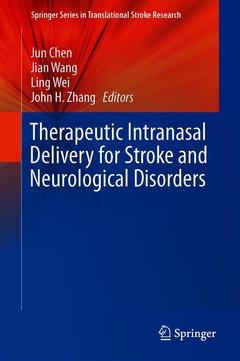Description
Therapeutic Intranasal Delivery for Stroke and Neurological Disorders, 1st ed. 2019
Springer Series in Translational Stroke Research Series
Coordinators: Chen Jun, Wang Jian, Wei Ling, Zhang John H.
Language: English
Subject for Therapeutic Intranasal Delivery for Stroke and...:
153 p. · 15.5x23.5 cm · Hardback
Description
/li>Contents
/li>Comment
/li>
Preface.- Transnasal Induction of Therapeutic Hypothermia for Neuroprotection.- Hypoxia-Primed Stem Cell Transplantation in Stroke.- Therapeutic potential of intranasal drug delivery in preclinical studies of ischemic stroke and intracerebral hemorrhage.- Intranasal Drug Delivery after Intracerebral Hemorrhage.- Intranasal Treatment in Subarachnoid Hemorrhage.- Intranasal Delivery of Therapeutic Peptides for Treatment of Ischemic Brain Injury.- Intranasal delivering method in the treatment of ischemic stroke.- Intranasal Delivery of Drugs for Ischemic Stroke Treatment: Targeting IL-17A.- Intranasal tPA application for axonal remodeling in rodent stroke and traumatic brain injury models.- Therapeutic Intranasal Delivery for Alzheimer’s disease.- Combination therapy of intranasal IGF-1 and hypothermia.- Intranasal Medication Delivery in Children for Brain Disorders.- Index.
Comprehensive overview of studies of intranasal delivery
Expected to have great impact on the field of translational stroke research
Useful for researchers, physicians, and drug developers?




